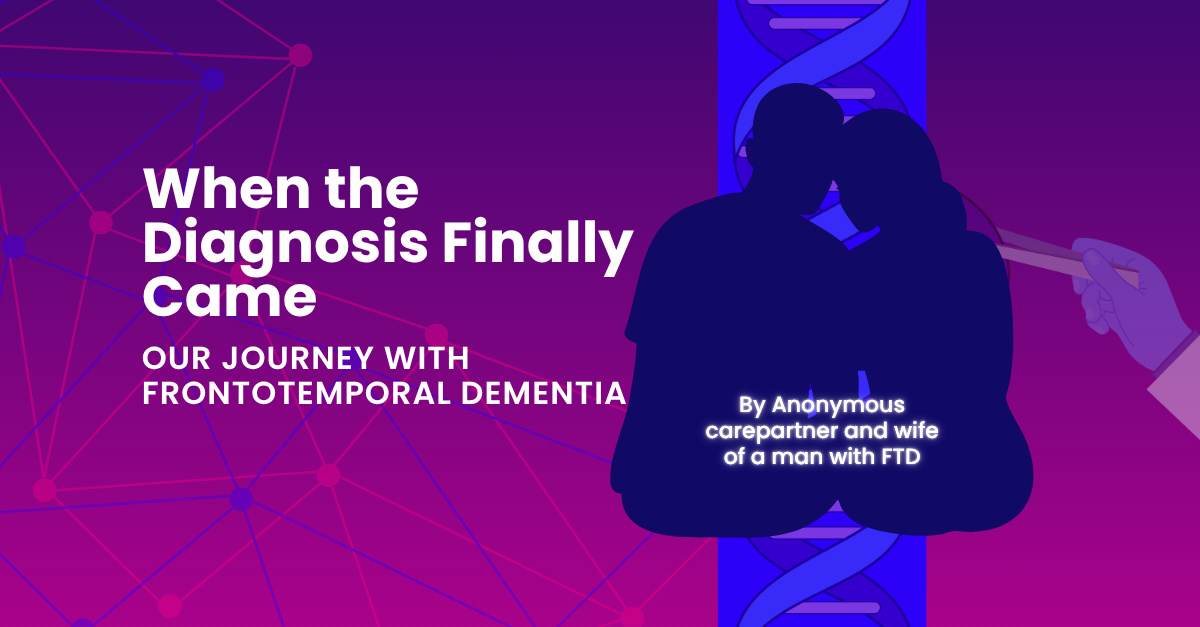BLOG
By Anonymous carepartner and wife of a man with FTD

"Your husband has frontotemporal dementia caused by a mutation in the progranulin gene."
Those words changed everything.
After two years of confusion, emotional strain, and countless appointments, we finally had an answer. Relief and despair collided in that moment. What followed was a journey I never expected—but one I now share in the hope that others might find answers sooner.
Five years ago, my husband began changing. He became agitated, compulsive, and withdrawn. Family gatherings turned tense. Arguments replaced connection. We wondered: was it depression? Bipolar disorder? Narcissism? I even considered divorce.
Then came the forgetfulness—missed appointments, lost wallets, forgotten conversations. His mother died in her mid-60’s following a diagnosis of primary progressive aphasia (PPA), a form of frontotemporal dementia. That memory haunted me. Still, we never imagined that what we were seeing could be dementia—he was only in his 50s, and his symptoms didn’t look anything like his mother’s illness.
We sought help. The first neurologist diagnosed “mild cognitive impairment” after a 10-minute screening. A PET scan came back “normal” and although neuropsych testing was normal, the deficits that were seen could not be explained or linked to a specific diagnosis. We were told to try therapy and meditation. No mention of his family history. No urgency.
Over the next year, his decline accelerated. We saw another neurologist who ordered more in-depth testing—an EEG and even a lumbar puncture. Still no clear answers. It wasn’t until this neurologist began asking more questions about his mother’s history when he finally connected the dots. I was surprised by the connection the neurologist made to my husband’s mother. His behavioral changes looked nothing like her dementia and aphasia (difficulties in understanding, speaking, reading, and writing); but despite the different symptoms that connection was the key.
That’s when we were referred to genetic counseling. A blood test confirmed a mutation in his progranulin (GRN) gene—and with it, a diagnosis: frontotemporal dementia (FTD).
I had never heard of the progranulin gene. I learned that this mutation is inherited, and that finding this mutation in my husband meant that my children each had a 50% chance of having this genetic change too. The mutation causes the brain to produce less progranulin, a protein that helps protect neurons. Without it, parts of the brain begin to shrink, especially the areas responsible for personality, behavior, and language.
We were devastated—but grateful for clarity. Knowing it was genetic helped us connect with researchers and other families. It gave us a name for what we were facing, and with that, a way forward. We set out to learn more, and to contribute to research that could possibly help not only my husband but also contribute to a future cure. If we didn't know that he had FTD or that his condition was caused by a mutation in the progranulin gene, we wouldn't have been able to ask the right questions or find clinical trials targeting progranulin.
FTD is often misdiagnosed. It can mimic psychiatric disorders or depression, especially early on. It can start with behavioral changes, speech changes, or movement changes, making it hard to connect cases in a family. And it doesn’t always show up on an MRI early in the disease. But genetic testing changed everything for us.
It opened the door to research opportunities and clinical trials. We enrolled in one not long after the diagnosis. It won’t reverse the damage already done, but we hope it might slow the progression—or help someone else in the future.
I just wish we’d known sooner.
If you’re facing similar struggles, here’s my advice:
And finally—don’t do this alone. Find others who understand. Ask questions. Share your story. There’s strength in being heard.
You are not alone. There is help, there is hope, and there is a community waiting to walk alongside you.
NOTE: The Site is provided for informational purposes only, and is not intended to provide, or be a substitute for, medical advice, diagnosis or treatment recommendations. Any user that intends to use information from the Site should first consult with their healthcare provider.
